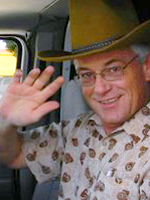$11 isn't $11 in WMI Lawyerland
By Leon WordenWednesday, March 6, 2002
| A |
"Dear Mr. Caravalho: On Feb. 20, 2002, The Signal ran (a column) by Leon Worden discussing the tipping fees paid by (WMI subsidiaries) Blue
The point of his letter is to explain how $11 isn't really $11; $11 is actually $26.91, or maybe $42.02.
Backing up: We're talking trash rates, and why your household trash rate is among the highest in Southern California.
It was a year ago February that another trash giant,
It sounded too good to be true, and probably was. But it set some Signal reporters on a quest to determine why Santa Clarita's household trash rates are the ninth highest out of 76 jurisdictions in Los Angeles County.
We learned that when the city set trash rates in 1996, they were based in part on the fallacy that the haulers were paying $34.33 a ton to dump trash at the local landfill. In fact they were paying $25.59, and their costs have fallen since. And your inflated 1996 rate was about to be locked in until 2006.
It took a full year, but last week's letter from the WMI lawyer was the company's first acknowledgment of what we already knew: WMI is paying just $11 a ton to dump trash at the Chiquita Canyon Landfill in Val Verde.
Stop right there, the lawyer says. Eleven dollars isn't really $11, because the dumping fee was negotiated as part of a bigger deal involving WMI predecessor USA Waste's sale of the Chiquita landfill operations to Republic Services in 1999.
"The consideration for the sale was approximately $32 million, plus the disposal agreement ($11 a ton)," the attorney writes. "The discount in the cash purchase price compared with market value was at least $28 million."
He's contending the landfill operations were worth $60 million, and USA Waste sold them to Republic for just $32 million in exchange for being able to dump trash at a bargain rate of $11 a ton.
Factor in the $28 million "prepayment for future disposal," he says, and the "real cost of disposal to Blue
OK, Mr. Lawyer, you stop right there.
As we've reported, when USA Waste (WMI) sold the landfill operations to Republic, part of the deal was to guarantee landfill capacity for WMI at the lower rate. Even if Santa Clarita canceled WMI's contract tomorrow, WMI still would be able to dump the same amount of trash for just $11 a ton.
The lawyer admits the 1999 deal lowered WMI's operating costs, then he asserts there's some higher "real" cost that WMI does not pay. It's an exercise in voodoo economics.
Let's pretend, though, that he's right. Let's consider his claim that the "real" value of the landfill business was $60 million.
Remember, USA Waste (WMI) owned the landfill business, while The Newhall Land and Farming Co. owned the landfill itself (the dirt). The landfill business is what USA Waste sold to Republic.
Newhall Land and Republic got in a big court fight in
"Currently, the fixed assets used in connection with the landfill," wrote Republic's lawyer in 2001, "are booked at $31,603,780, far in excess of the $15 million (Newhall Land's lawyer) proposes."
That's right. Chiquita's assets are worth $32 million, Republic said.
Could the landfill business have been worth $60 million in 1999 and only $32 million in 2001? Did it shrink? No.
WMI's lawyer says USA Waste paid $60 million for the landfill business in 1997. Did USA Waste overpay in 1997? Don't know. Did it sell Chiquita to Republic at a loss? Don't care. The Chiquita sale was part of a giant divestiture ordered by the U.S. Justice Department's antitrust division. USA Waste sold off numerous subsidiaries across the country, including Chiquita, before the feds would allow it to take over WMI in
Did these two huge companies merge because they thought it would be a neat way to lose money? No.
WMI's Karl McCarthy put it more simply and honestly when he told me several months ago that Blue Barrel was paying "a helluva lot more" to dump trash before the 1999 landfill deal. No matter how WMI's lawyer plays with the numbers, WMI pays $11 to dump trash in Chiquita. Not $26.91, not $42.02.
The lawyer plays one last game of "garbage in, garbage out." He makes the mistake of admitting the haulers' dumping fees were $25.59 when the city added the
The formula, agreed to by the trash companies, calculated all pertinent factors, including the haulers' operating costs and the new recycling program. It assumed a dumping fee of $34.33— not the actual rate, $25.59— when it computed your $22.13 rate. Plug in the actual $25.59 dumping fee, much less $11, and your monthly trash bill would be lower today.
In June the Securities and Exchange Commission levied its
And the champion of fuzzy math says $11 isn't $11.
I leave you with this.
We pay $22.13 a month to have our trash hauled. BFI and Republic have each offered to do the same job for about $18.50. Questions?
©2002 LEON WORDEN — ALL RIGHTS RESERVED

